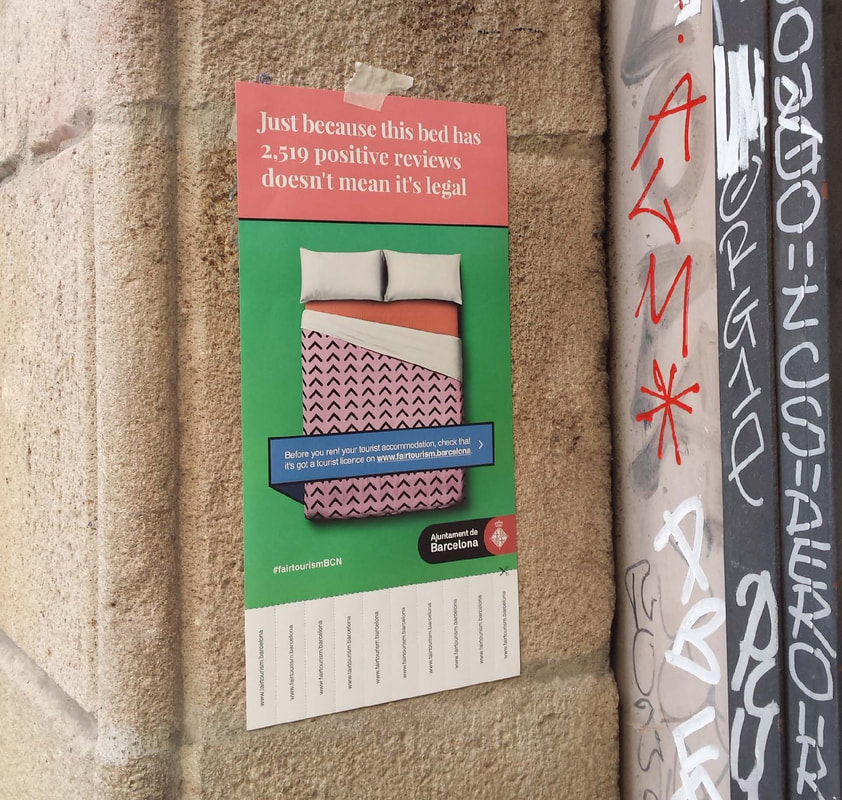Regulating short-term rentals
|
| ||
|
Image: Awareness-raising campaign on illegal short-term rentals, Ajuntament de Barcelona. (c) Claire Colomb, 2017).
Citation: Colomb, C. and Moreira de Souza, T. (2021) Regulating short-term rentals. Platform-based property rentals in European cities: the policy debates.
London: Property Research Trust. DOI: https://doi.org/10.52915/KKKD3578 Keywords: Covid-19 Pandemic, Housing shortage, Housing policy, Short-term rentals. |
Summary:
The short-term renting of a property to visitors is not new. However, the rise of internet-based platforms — digital marketplaces that match supply and demand — has fuelled the diversification and expansion of this practice in an unprecedented way. The market leader in the short-term accommodation sector is Airbnb, created in 2008 to allow landlords and tenants to advertise their homes for short-term rental. There now exists a variety of short-term rental platforms that differ in terms of their business models (peer-to-peer, business-to-consumer or both), their links with giants of the online travel industry, their geographical coverage and the types of accommodation they offer. Their offer has grown rapidly over the past decade, although interrupted in 2020 by the onset of the COVID-19 pandemic. The likelihood is that as recovery from the pandemic comes about, the short-term rental market will rebound. This project analyses and compares how public actors in large European cities have attempted to regulate platform-mediated short-term rentals, and outlines which implementation and enforcement challenges they have faced in doing so. The objectives of the research were to:
|
Authors
Claire Colomb (BAHons PhD MRTPI FAcSS) is Professor of Urban Studies and Planning at the Bartlett School of Planning, University College London (UCL). She is a social scientist and urban planner by background, with a first degree in Politics and Sociology from Sciences-Po, Paris and a PhD in Town Planning from University College London. Her research interests include international and comparative planning; urban sociology and urban politics in European cities. She is the author of the book Staging the New Berlin (Routledge, 2011), European Spatial Planning and Territorial Cooperation (Routledge, 2010, with S. Dühr and V. Nadin), and co-editor of the book Protest and Resistance in the Tourist City (Routledge, 2016, with J. Novy). See research profile and publications at https://iris.ucl.ac.uk/iris/browse/profile?upi=CMCOL44.
Tatiana Moreira de Souza (BSc MSc PhD) is Research Fellow in Urban Planning and Property Markets at the School of the Built Environment, Oxford Brookes University. She holds a first degree in Architecture and Urbanism from the University of São Paulo, Brazil, a MSc in Urban Regeneration and a PhD in Planning Studies from University College London (UCL). Her research interests include international and comparative planning and housing; urban regeneration, social mix policies and neighbourhood change; security of tenure, the private rented sector and landlord/tenant relations. See research profile and publications at https://www.brookes.ac.uk/templates/pages/staff.aspx?uid=p0088115.
Tatiana Moreira de Souza (BSc MSc PhD) is Research Fellow in Urban Planning and Property Markets at the School of the Built Environment, Oxford Brookes University. She holds a first degree in Architecture and Urbanism from the University of São Paulo, Brazil, a MSc in Urban Regeneration and a PhD in Planning Studies from University College London (UCL). Her research interests include international and comparative planning and housing; urban regeneration, social mix policies and neighbourhood change; security of tenure, the private rented sector and landlord/tenant relations. See research profile and publications at https://www.brookes.ac.uk/templates/pages/staff.aspx?uid=p0088115.

